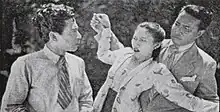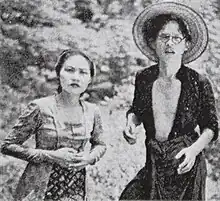Salmah
Nji Siti Salmah (born 6 June 1926) is an Indonesian actress and singer whose career spanned the 1940s to the 1970s. Her varied career spanned film, stage, and radio. She was the part of Classical Indonesian Cinema.
Salmah | |
|---|---|
%252C_p31.jpg.webp) Salmah in 1954 | |
| Born | Nji Siti Salmah 6 June 1926 Buitenzorg, Dutch East Indies |
| Nationality | Indonesian |
| Occupations |
|
| Years active | 1942–1959, 1973–1977 |
| Spouse |
Eddy Jono
(m. 1946; sep 1954) |
Early life
Nji Siti Salmah was born on 6 June 1926 in Buitenzorg, Dutch East Indies, as the youngest of five children from a Sundanese farmer family, and was raised in Tjiandjoer.[1][2]
Personal life
%252C_p38.jpg.webp)
Salmah was married to Eddy Jono, an employee of PELNI, in 1946, and has one child.[3][1] The couple separated in November 1954.[4] In March 1955, Salmah resided in Kebon Kosong, Kemayoran, while Jono resided in Jatinegara.[3]
Career

.jpg.webp)
%252C_p13.jpg.webp)
Salmah started her career by joining the Dendang troupe during the Japanese occupation of the Dutch East Indies. She later joined the Djantung Hati troupe.[1] She joined the Miss Noni Beng Hwat Naut troupe as a singer and later became a friend with S. Waldy, who introduced her to Tan & Wong studio.[3]
After the Indonesian National Revolution ended in 1949, Salmah was contracted by Tan & Wong with the Warnasari troupe.[1] She made her film debut with Tirtonadi (1950), followed by Kembang Katjang (1950) and Nusa Kambangan (1950).[5] She was the most productive actress in Tan & Wong's films from 1951 until 1952, where she appeared in seven films: Kusuma Hati (1951), Siti Aminah (1951), Fadjar Menjingsing (1951), Ternoda (1952), Chandra Dewi (1952), Maskawin (1952) and Tiga Benda Adjaib (1952).[6] Most of her films were directed by Henry L. Duarte, an American director who established the Warnasari troupe.[6]
In 1953, she was dismissed by Tan & Wong and moved to Golden Arrow.[1] She starred in six films for Golden Arrow studio: Pangeran Hamid (1953), Empat Sekawan (1953), Burung Bitjara (1953), Harimau dan Merpati (1953), Tiga Saudari (1953) and Kelenting Kuning (1954).[5]
%252C_p12.jpg.webp)
During the production of Perobahan (1955), she replaced Nurnaningsih who was sacked because of absence.[7] Salmah later took a 19-year break, returning to the industry in Arizal and Wisjnu Mouradhy's directed Gara-gara (1973).[5] After she returned to industry, she was no longer offered leading roles, and instead took supporting roles in three more films in the 1970s (Anak yang Menderita (1974), Rintihan Gadis Buta (1976) and Duel Maut (1977)) before finally leaving the industry.[5]
Filmography

| Year | Film | Role | Notes |
|---|---|---|---|
| 1950 | Tirtonadi | ||
| 1950 | Kembang Katjang | ||
| 1950 | Nusa Kambangan | Credited as Siti Salmah | |
| 1951 | Kusuma Hati | ||
| 1951 | Siti Aminah | ||
| 1951 | Fadjar Menjingsing | ||
| 1952 | Ternoda | ||
| 1952 | Chandra Dewi | ||
| 1952 | Mas Kawin | ||
| 1952 | Tiga Benda Adjaib | ||
| 1954 | Djandjiku Djandjimu | Uncredited |
References
- Umboh 1953.
- Samin 1955, p. 12.
- Samin 1955, p. 13.
- Samin 1954, p. 38.
- Biran 1979, p. 427.
- Samin 1953, p. 13.
- Samin 1953, p. 8–9.
Works cited
- Wim, Umboh (1953-08-20). "Memperkenalkan: Salmah". Seputar Teater Indonesia (in Indonesian). Retrieved 2023-06-08.
- Biran, Misbach Yusa (1979). Apa siapa orang film Indonesia, 1926-1978 (in Indonesian). Yayasan Artis Film : Sinematik Indonesia.
- Samin, Djamal (1954-11-11). Film Varia No. 11 (in Indonesian). Jakarta: N. V. Djamal Samin.
- Samin, Djamal (1955-05-03). Film Varia No. 3 (in Indonesian). Jakarta: Film Varia.